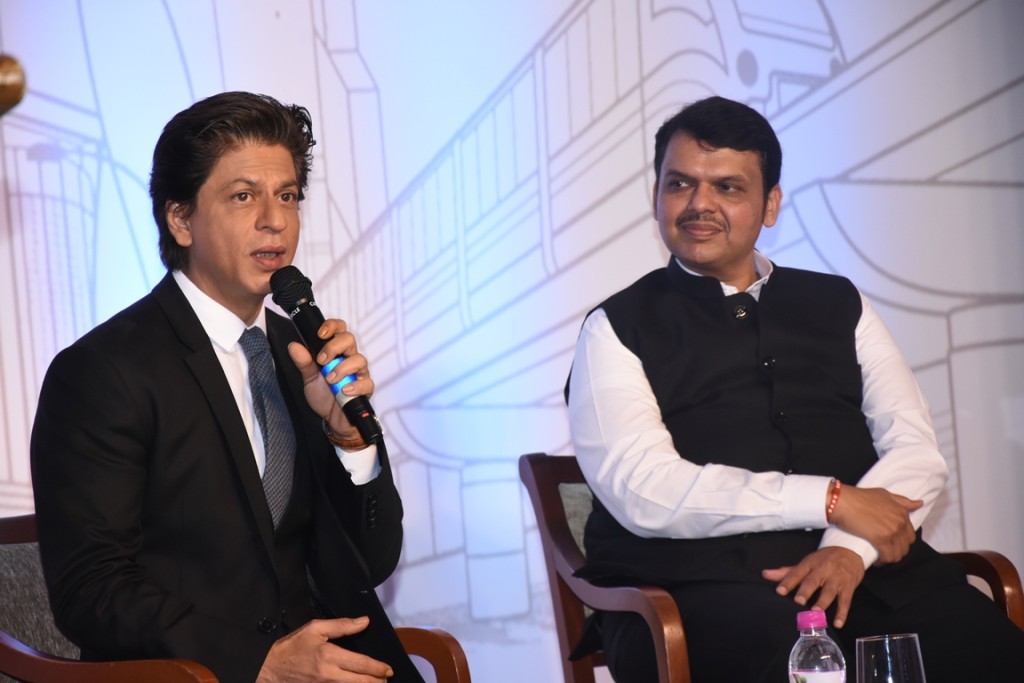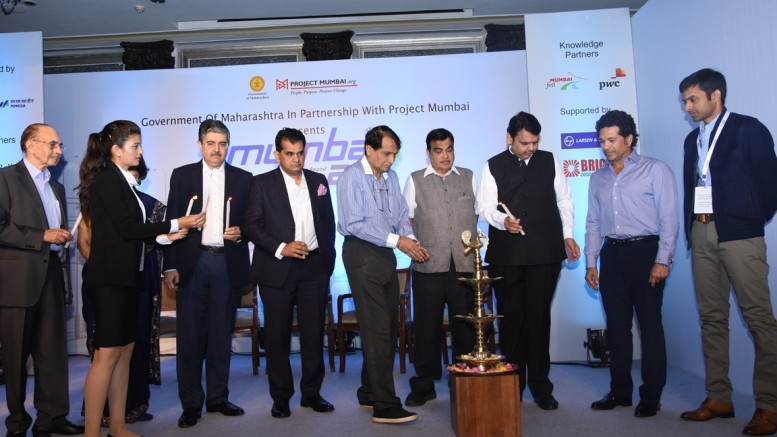
Devendra Fadnavis, Hon’ble Chief Minister of Maharashtra and Shah Rukh Khan.
#ProjectMumbai4BetterLiving
Mumbai, December 01, 2018 (GPN) : Ensuring a slum-free Mumbai alone will make Mumbai a truly global city, Maharshtra Chief Minister Devendra Fadnavis today said asserting that Development Plan has unlocked the land potential to provide one million affordable houses in the metropolis. #
Addressing the half-day-long conclave titled “Mumbai 2.0” here; Fadnavis said the new development plan will change the face of housing in Mumbai. Providing good housing and good life to the people, keeps him going, the chief minister reiterated during a Q&A session with Bollywood superstar Shahrukh Khan at the end of the conclave.
Listing out the various infrastructure projects undertaken by the government in Mumbai, Fadnavis said all these projects have been conceived nearly two decades ago, but his government is merely executing them.
“Mumbai 2.0” has been organised under the aegis of Project Mumbai, an independent think-tank, working to make Mumbai a better place to live, in tandem with the Government of Maharashtra.
Leading policymakers such as Nitin Gadkari, Suresh Prabhu and Amitabh Kant and corporate honchos like Uday Kotak, Adi Godrej, S N Subrahmanyan, G V Sanjay Reddy, Kalpana Morparia. Sachin Tendulkar and Pulela Gopichand from the sporting world were also present on the occasion.
Besides taking stock of the infrastructure projects undertaken by the state government, the conclave charted a blueprint for improved infrastructure, creating more jobs and livability index of the country’s financial capital.
Earlier in his inaugural address, Union Minister for Road Transport and Highways, Shipping and Water Resources, River Development and Ganga Rejuvenation, Nitin Gadkari underlined the need to undertake projects—which are viable ethically, economically, ecologically and environmentally.
Gadkari stressed the need to reduce pollution and rail and road traffic congestion, by effective utilization of water transport.
The union minister asserted that water transport would be 10 times cheaper than the road transport and can get the commercial capital rid of pollution.
Highlighting the efforts of his ministry, Gadkari said nearly 750-800 Ha of eastern front of Mumbai will be developed in the days to come. An Rs 1,000 crore-worth international cruise terminal will be built which will significantly up the cruise movement to 950 cruises and 20-25 lakh tourists visiting the city. This means addition of $30,000 to the economy.
He spoke about future projects such as connecting south Mumbai to Neral and Mandavi, water transport to the new international airport and a state-of-the-art super-specialty hospital on Mumbai port trust land on a 17-acre plot.
Union Minister for Commerce, Industry and Civil Aviation, Suresh Prabhu said that Mumbai has played a vital role in escalating India’s ranking in the ease of doing business. Prabhu said that the need of the hour is to focus on the findings of Mumbai 2.0 for rejuvenating the city. The minister also said that importance should be given to climate change for which a Climate Proof Action Plan should be formulated to address all risks associated with Climate change.
Amitabh Kant, CEO, NITI Aayog moderated the session on infrastructure upgrade which deliberated on improving mobility, effective solid waste and water supply management, and parking woes. Those participated in the session include, MMRDA Commissioner, R A Rajeev, S N. Subrahmanyan, CEO & MD, L&T and Sanjay Reddy, Vice Chairman, GVK.
The panelists were unanimous in their view that the city needs to concentrate on e-commerce and millennial workforce. Some of the key takeaways from the panel discussion was improving infrastructure and warehousing. It was suggested that Mumbai’s e-commerce and logistics can play a major part in the growth of the city.
Uday Kotak, MD Kotak Mahindra Bank, moderated the outcome-driven session on boosting economic activity and job creation. It saw participation of Kalpana Morparia, Sanjay Nair, BMC Commissioner, Ajoy Mehta and Ravi Raheja of Raheja Realty.
The panel asserted that financial services, which creates 8-10 per cent of jobs annually remains the biggest growth engine of the country’s commercial capital. The participants stated that Mumbai should continue to lead the financial services sector with fund managers operating from the city instead of Singapore. It was stressed that off-shoring could give big boost to the micro enterprises.
Participating in the session making Mumbai a livable city, titled ““How we Live: Better Living and Quality of Life”, ace Badminton coach, Pulela Gopichand said “during the last few years we have looked out at alphabetical literacy and numerical literacy but in the process we have missed out on physical literacy”. He stressed on the need to prioritise to build a sporting infrastructure.
Instead of hospital infrastructure, we should have sporting infrastructure, he added.
The panel discussion was moderated by Ronnie Screwvala of UTV while others participants included Ritesh Agarwal of OYO Rooms, Bhushan Gagrani, principal secretary in Chief Minister’s Office, Ashish Hemrajani of BookMyshow and noted environmentalist Bittu Sahgal participated in the discussion.
Highligting the need to renovate, Agarwal said Mumbai has an infrastructure in place, and an eco-system support which is important to improve the quality of life. It is imperative that we need to renovate and restore the available infrastructure. 11.2 % of the housing stock in Mumbai is vacant which is an amazing opportunity is for the people of the city.
Mumbai 2.0, is committed to creating time-bound and action-oriented outcomes for Mumbai. These outcomes would then be driven by the Chief Minister’s War room, and civil society institutions such as Project Mumbai will support and monitor their time-bound progress.
The financial and commercial capital of country contributes more than 6 percent of the nation’s GDP, 10 percent of factory employment, 60 percent of customs duty collection, and 30 percent of income tax collections. Mumbai is ranked third on the livability index.
Video Link: https://we.tl/t-
About Project Mumbai:
Project Mumbai is a not for profit Public trust. People, Purpose and Positive change remain its objectives and it is committed to playing the role of a catalyst between civil society and the policymakers. Primarily, it will also engage in initiatives of change at the ground level, impacting people’s lives.
Project Mumbai has been set up by Leaders of the private sector, civil society, and Industry captains.
Recently, Project Mumbai launched The Mumbai Plastic Recyclothon, a massive plastic donation and collection drive across Mumbai. The donated plastic will now be recycled and converted into Benches, meant exclusively for senior citizens, across the gardens and open spaces of Mumbai. The MCGM has approved this project. A massive Plastic Art work, part of the donated plastic, will come up in MMRDA too.
Project Mumbai can be reached on www.projectmumbai.org

